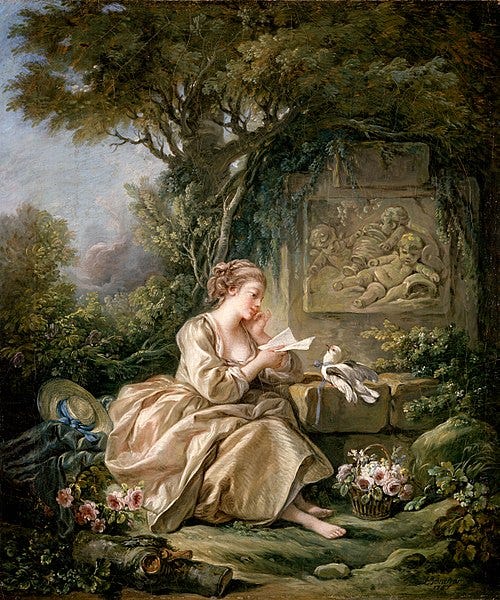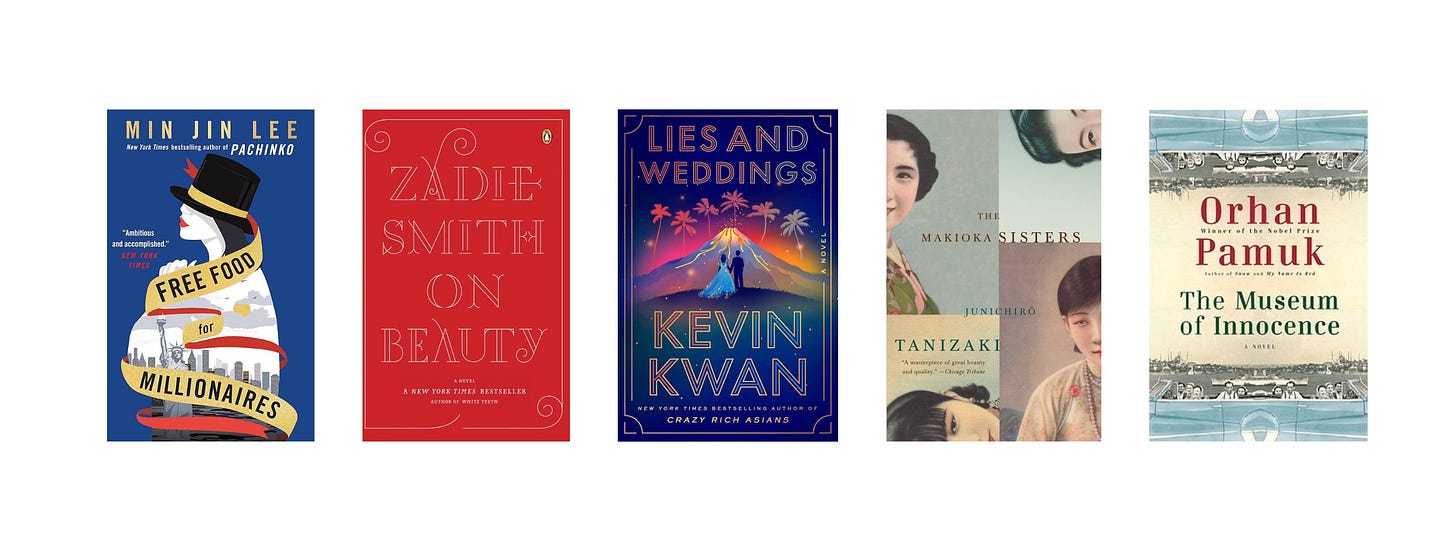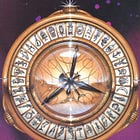The Modern Novel of Manners: Social Satire, Morality, and Austen’s Descendants
A nerdy deep dive and five modern novels of manners I recommend
This month we’re all about Emma by Jane Austen. Emma is a longtime favorite of mine, and I was so excited to get to discuss the book with Neha.
As I was sitting and thinking about Emma, its relationship to Shakespeare’s comedies (more on this in the podcast episode) and why I love it so much (it is my favorite Austen, tied with Pride and Prejudice), I realized that that many of the novels I love the most are books that might be called novels of manners. So of course, I had to do a deep dive to figure out where this style came from and how it has evolved, and share some recommendations with you.
In this newsletter you’ll find:
Manners vs. Morality: The Differences between The Novel of Manners and the Social Novel
Jane Austen’s Descendants: Five Modern Novels of Manners I Recommend
*This is a long newsletter, so read it in your browser or in the app!
The Novel Tea is a mostly free newsletter. If you enjoy our work, consider upgrading to a paid subscription to show your support. In addition to newsletters and podcast episodes on Wednesdays (which are free to all), paid subscribers get access to:
Monthly Spill the Novel Tea installments (like this one) featuring reviews and analyses of the books we’re reading and loving (and sometimes hating)
Occasional bonus Saturday posts like this one that pairs modern art and literature or this one in which we review and reflect on a buzzy book
Access to on-demand personalized book recommendations — for when you just need to read something with a specific vibe
Ongoing support for everything we do at The Novel Tea, including our podcast episodes, newsletters,1 and potential future projects (like merch!)
What is a Novel of Manners?

The short answer is: there doesn’t seem to be a consensus. I searched high and low, but I could not figure out who first used this term —possibly it was Lionel Trilling (more on him below) — but in any case, here's the definition I'm going with:
A novel of manners is a work of fiction that focuses on the social customs, conventions, or behaviors of a particular social group; often exploring how characters navigate interpersonal relationships and societal expectations.
An apt description, no? Hits the nail right on the head for Austen’s novels.
But very quickly, I ran into a problem. In addition to the Novel of Manners, there is also the Social Novel. Until recently, I had been using the two fairly interchangeably — but the more I thought on it, the more I realized that, while there are some similarities, they represent two distinct styles.
Manners vs. Morality: The Differences between The Novel of Manners and the Social Novel
The novel of manners is most often written in a satirical or ironic tone, using its characters and scenarios to poke fun at and/or expose flaws in a particular group. By contrast, the social novel is not necessarily humorous or satirical; instead, it attempts to carefully explore a particular fact of society (eg, gender, race, class, wealth) through a more discursive or expositional style.
Additionally, the styles have different predecessors; I believe that a novel of manners is more closely aligned with the theatrical tradition (and owes a lot to Shakespeare's comedies), while the social novel is descendant from early novel forms such as Don Quixote.
Here's a quick comparison:2

Now, here comes the difficulty: some novels can be quite easily categorized into one or the other. For example, Emma is clearly a comedy of manners. And Middlemarch is most definitely a social novel. But what about Vanity Fair? There are satirical elements as well as a strong moral throughline. The book exposes and pokes fun at society in equal measure.
And if a comedy of manners involves characters going from rags to riches, or characters who maintain their social class, then is there also a tragedy of manners, in which characters slowly lose their wealth or social standing?
I believe there is — and a classic example of the tragedy of manners is Edith Wharton’s The House of Mirth. Lily Bass was once a fresh young thing with dozens of prospects and a comfortable living. But very quickly, we learn that she has been living beyond her means, and if she doesn’t find someone to marry soon, she’ll be in a dangerous financial situation.
And, if we take it even further: is the novel of manners limited to the upper crust of society, and those aspiring to enter its ranks? Can a novel of manners be written about characters living in poverty, or would it then be called something else?
As you can see, the more we think, the muddier things get.
Does The American Novel of Manners Exist?
One of the first people to describe novels in terms of ‘manners’ was Lionel Trilling, an American literary critic. At a conference in 1947, he said:
“What I understand by manners… is a culture’s hum and buzz of implication.”
He then goes on to say: “It is that part of culture which is made up of half-uttered or unuttered or unutterable expressions of value. They are hinted at by small actions, sometimes by the arts of dress or decoration, sometimes by tone, gesture, emphasis or rhythm, sometimes by the words that are used with a special frequency or a special meaning…It is the part of culture which is not art, nor religion, nor morals, nor politics, and yet it relates to all these highly formulated departments of culture.” (emphasis my own)
Reading these words, my mind went to Jane Austen and Edith Wharton, two authors who pay close attention to manners and their implications. Henry James, too (I could not get through The Portrait of a Lady — though perhaps I ought to give him another chance).
However, Trilling goes on to say that the novel, as he has described it, actually never established itself in America.
“The novel in America diverges from its classic intention, which, as I have said, is the investigation of the problem of reality beginning in the social field. The fact is that American writers of genius have not turned their minds to society.”
And Trilling hypothesizes that this absence of ‘manners’ in the American novel is due to the fact that Americans are resistant to looking closely at society; that there is an unspoken rule here that describing and deconstructing matters of class is somehow demeaning.
When considering some older classic examples of American literature — Poe, Melville, Twain — I have to agree with Trilling. Perhaps classical American literature is much more concerned with the individual, or even the family unit, than with society at large.
Not everyone bought Trilling’s argument. Here is an excerpt from an amusing takedown by David H. Hirsch:
Still, I’m inclined to side with Trilling. I do think that perhaps America3 is more concerned with ideas of individualism than other countries/cultures, and this has seeped into our conception of what the novel might be. I can think of no great American social novel on the scale of War and Peace or Les Misérables — Gone With the Wind might be offered forth, but it is only secondarily a novel of society; its primary goal is chronicling the life and development of its heroine, Scarlett O’Hara. (If you can think of a great American social novel, or novel of manners, please let me know!)
But… I also think that individualism is only one facet of the many cultures and ways of life that exist in America.
And so I wanted to know: where is the novel of manners today?
Where Are We Now? The Modern Novel of Manners
A few months ago I came across this article that describes Sally Rooney as a writer of the millennial novel of manners.
“As with any great novel of manners, Normal People’s politics—which emphasizes relationships as the site of interpersonal transformation rather than the individual’s capacity to change society or themselves by their own will—manifests itself in the building of characters, not the rhetorical proving wrought through individual conversations.”
But I have to disagree.
I’ve said already that the novel of manners is descended from the theatrical comedy. Sally Rooney’s books deal primarily with interior conflict — assumptions, miscommunications, conflicting desires; and for a book to be a novel of manners, I believe there has to be significant external conflict. So we cannot call Normal People a novel of manners.
Then does the contemporary novel of manners exist?
I’d love to hear your thoughts on ‘the novel of manners’ and whether my contemporary recommendations stack up!
Jane Austen’s Descendants: Five Modern Novels of Manners I Recommend
Free Food for Millionaires by Min Jin Lee
Free Food for Millionaires follows Casey Han and a large cast of characters in her circle, from their early to mid-twenties, as they deal with their careers and love lives, and try to figure out who they are.
One of the central tensions in this novel is Casey’s desire to be rich, and her constant struggle with money and the idea of wealth in a society that wants her to pursue a dull but high-paying and prestigious job.
Lee makes explicit reference to the 19th century social novel: Casey constantly carries around a tattered copy of Middlemarch that she reads and re-reads as she struggles to define herself. She is also obsessed with hats — she makes them, buys them, and sells them — and I found this detail charming.
After over 700 pages of novel, does Casey ultimately become a better version of herself? I’m not sure — and this fact, combined with other specific plot points in the novel, make this a tragedy of manners.
Though I had some minor issues with certain aspects of the book’s execution, overall I really enjoyed Free Food for Millionaires, and would recommend it to anyone who wants the feeling of a 19th century social novel set in the current day.
On Beauty by Zadie Smith
I’ll admit, this one confused me: is it a novel of manners? Or a social novel? Or a campus novel? Or a mixture of all three?
On Beauty is a loose retelling of Howard’s End; it follows two families living in the college town of Wellington, Massachusetts as they butt heads in their political ideologies and attitudes about the world.
In fact, as I’m writing this, I think On Beauty is none of the above — I think it is instead a novel of ideas. Through its very readable pages and its compelling characters, the book asks: what does it mean to desire someone else? How do we approach the idea of a woman’s beauty in today’s world? Who are we responsible to, in our lives? What are the actual divisions that separate ‘conservative’ and ‘liberal’?
Smith is an incredibly talented writer; in the many campus scenes, from lectures to fights to extracurriculars (I vividly remember a specific scene in which a character realizes that a ‘glee’ group is about to perform, and he is so exasperated that he tries to make a run for it) I felt as if I were actually there, alongside these characters, living in their interactions.
Lies and Weddings by Kevin Kwan
I probably could have put any Kwan book on here, but Lies and Weddings is the only one I’ve actually read (I know! I’m working to rectify this as soon as possible!). A loose retelling of Doctor Thorne, this novel follows Rufus Leung Gresham, a future Earl, and his family and neighbors in Greshamsbury (though the book is set across many exotic locations) through all kinds of schemes, disagreements, mistaken relationships, and more fun.
This might be the only true comedy of manners on this list. And what a comedy it is! I had such fun reading about exciting travel to foreign countries, fancy weddings, designer clothes, and expensive mansions. And, sure, the book doesn’t exactly deal with many serious issues (though of course as in many of Kwan’s books, the questions of race and birthright are ever present) — but not every book has to be serious!
This book made me an unequivocal fan, and I can’t wait to read Kwan’s other books.
The Makioka Sisters by Jun'ichirō Tanizaki
Alright, I’m cheating a bit, because this isn’t modern by any standards. But it is a non-Western story, and we’re always looking to amplify underrepresented stories here at The Novel Tea.
Published in 1936, this book follows four sisters in an old aristocratic family living in Osaka in the years immediately before World War II, each different in nature and ambition. The book to me feels like a still life painting: it attempts to capture the many vignettes of life, through everyday happenings and a few dramatic surprises.
The four sisters are vastly different yet united by their love for one another; fans of Little Women will love this title.
The Museum of Innocence by Orhan Pamuk
Once again, I’m not 100% sure about my categorization here — is this a novel of manners, or a social novel? Is it both?
The Museum of Innocence takes place in Istanbul in the 70s. Kemal is about to become engaged to Sibel — both wealthy members of prominent families — when he encounters Füsun, a beautiful shopgirl whom he quickly falls for.
This story straddles the duality of Istanbul: East and West, old and new, rich and poor. I read this book so long ago that all I can really remember is that I loved it — I loved its rich atmosphere, the opulence of the city, the “hidden” side of Istanbul, and the heartbreaking yearning that seeps through its pages.
*
So, what do you think? Does the contemporary novel of manners exist?
Having discovered that I love this style of novel, I can’t get enough — share your recommendations below!
— Shruti
Links We Love
- wrote this great guide to Shakespeare’s plays for anyone looking to dive in and wondering where to start
- explored horses in Edith Wharton’s The Custom of the Country and now we want to go back and reread it, to find all the equine references!
Black Dandyism in the Spotlight: 7 Pieces of Fashion History [NYT gift link] — the Met gala was on Monday! Here’s some history behind this year’s theme.
8 short classic books you can read in an afternoon for when you need a quick read — by
From the Vault
Up Next on the Podcast
Next week we will be discussing Emma adaptations, including (but not limited to): Clueless, Emma 1996s (Paltrow and Beckinsale), Emma 2020, and more! Tune in to The Novel Tea wherever you get your podcasts on May 14th
We recently changed our newsletter format to twice a month, and I could not be more grateful. I finally, after months, got the chance to do a true deep dive with tons of research to write this very newsletter, and I’m so glad we made the switch. Your support enables these kinds of long form pieces, and we are so grateful!
My qualifications for creating this table are that I read a lot, I think about books all the time, and I have a JSTOR account.
Of course I am using this term broadly, and this country contains multitudes.











This post really got me thinking! Wharton immediately comes to mind for a novelist of manners but everything else I think of seems to be more of a social novel (or not fit into either category beyond "book about class" lol like The Wedding).
I loved Free Food for Millionaires and On Beauty so very happy to see them both here although I'm not sure On Beauty will hold up for me after 10 years
It was about 45 years ago now when I read “An American Tragedy” by Theodore Dreiser, but when thinking about American literature that is a novel of manners, I thought of it. Also, I tried to read back then but was unable to finish even the first book of John Dos Passos’ USA trilogy. Maybe I should try again. I love comedies of manners so back then I was reading Jane Austen and then grew into Barbara Pym